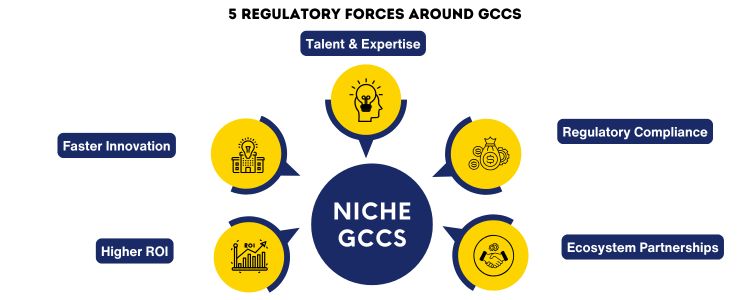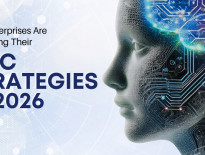
Global Capability Centers (GCCs) are in a new era. Based on size and cost arbitrage, it began as large shared services locations and knowledge process outsourcing hubs and has since grown into specialised engines of innovation and strategic delivery. India alone has over 1,900 GCCs today, with nearly 1.9 million professionals earning approximately $64.6 billion in revenue, which is bound to grow to a market of nearly 110B by 2030. These headline figures indicate the definite change: businesses have begun to appreciate the depth of capability in a bid to embrace the breadth of tasks.
Early-generation GCCs and traditional shared services centers provided excessively efficient operations and predictable savings. The new breed of niche GCCs, however, are structured based on different capabilities such as AI/GenAI R&D, cybersecurity threat intelligence, semiconductor design, fintech risk models, and medtech analytics. This shift makes the global delivery model: GCCs are not offshoring nodes anymore but the strategic extensions of the headquarters which have the mission to create products, develop IPs and be resistant to regulatory risks.
There are several forces convergent to the emergence of niche GCCs.
Some of the brief perspectives of niche GCCs are becoming manifest in industries and the value they provide in their strategic way: This table shows how the global delivery model is in the process of being retooled: the organising principle is capabilities, rather than tasks.
Niche GCCs provide physical economic gains as well as headcount savings. They generate high-value employment, which raises the average revenue per worker, generates exportable services, and spurs the creation of local innovation ecosystems (universities, startups, and specialist vendors). The ability-centred services market forecasts are promising, and the global market estimates reflect the further development in the given direction over the next decade, which highlights the beneficial macroeconomic effect of capability-based GCC investments. These centres end up being sources of national employment, skill development, and export revenues.
The benefits of niche GCC strategies among enterprises are several: These benefits turn the global capability centre into a strategic tool for businesses that are future-proof, not just a choice.
There is also the problem of specialisation. Competitive hiring and wage inflation within the niche skills are caused by talent scarcity. Overspending on hyper-specialisation will result in a lack of adaptability in the event that the market changes. To reduce such risks, companies should invest in reskilling routes, powerful governance models, and close correlation between GCC roadmaps and corporate strategy. Good performance metrics ought to be a combination of delivery KPIs and innovation milestones (e.g., patents, platform launches, and time-to-market measures).
In the future, niche GCCs will be more viewed as Capability-as-a-Service (CaaS) offerings of global organisations. Hybrid delivery models, GCCs will be able to expand and serve many regions with modular capabilities, and there will be even more collaboration with academia and startups. The GCC landscape will expand to the massive level of over 2,000 centres by 2030, with over 2.5 million professionals on its books, turning GCCs into the key drivers of enterprise digital transformation in GCC businesses and long-term value generation.
The emergence of niche GCCs signals a qualitative, purposeful move: from cost-based shared services to capability-rich centres, which induce innovation, resilience and economic value. The need to construct GCCs based on outstanding capabilities, to tie them closely to strategy, and to think of them as drivers of growth rather than back-office extensions is quite urgent in the case of organisations rethinking their global delivery model. The individuals whose transition will be in the frontline of the next generation of enterprise change.
Collaborate with Inductus GCC and develop Global Capability Centres of the future. We assist businesses in building specialized centers that enhance innovation, digital transformation and long-term business value between strategy and execution.
A GCC is an offshore facility of a multinational company that undertakes niche roles such as research and development, information technology service and strategic management. It is a government program that gives the women entrepreneurs up to 1 crore in bank loans to fund greenfield projects. Personal responsibilities and unconscious bias are the factors that lead to their mid-career attrition and slow them down in their careers. They introduce new ideas, understanding, and team-oriented leadership that speeds up the advancement of such areas as AI and cybersecurity. By 2030, women are expected to take up 25-30 per cent of GCC leadership positions, which will be paramount to the growth of the Indian market. Aditi, with a strong background in forensic science and biotechnology, brings an innovative scientific perspective to her work. Her expertise spans research, analytics, and strategic advisory in consulting and GCC environments. She has published numerous research papers and articles. A versatile writer in both technical and creative domains, Aditi excels at translating complex subjects into compelling insights. Which she aligns seamlessly with consulting, advisory domain, and GCC operations. Her ability to bridge science, business, and storytelling positions her as a strategic thinker who can drive data-informed decision-making.
Between Shared Services and Strategic Centres
Why Specialisation Wins Now

Niche GCCs – Industry Snapshot
Industry / Domain
Niche GCC Focus
Example Capabilities
Strategic Value
BFSI & Fintech
Risk analytics & fraud detection GCCs
AI fraud models, AML analytics
Protects global financial flows; regulatory compliance
Healthcare & Life Sciences
Clinical analytics & R&D GCCs
Trial analytics, bioinformatics
Accelerates drug discovery; lowers R&D timelines
Technology & Semiconductors
Chip design & embedded systems GCCs
SoC design, verification labs
Strengthens supply chain resilience; IP creation
Cybersecurity
Threat intelligence GCCs
SOC, threat hunting, resilience engineering
Lowers breach risk; enables secure global delivery
Retail & E-commerce
Digital experience GCCs
Personalisation engines, supply-chain AI
Drives customer lifetime value and margins
Economic Benefits
Effective Enterprise Advantages.
Issues and Governance Needs
Capability As A Service
Conclusion
frequently asked questions (FAQs)

Aditi
Hey, like this? Why not share it with a buddy?
Related Posts
Recent Blog / Post
- Pharma GCC Setup Services in India: Strategic Considerations for CXOs January 9, 2026
- Why Enterprises Are Rethinking Their GCC Strategies in 2026 January 8, 2026
- Why Most Enterprise Expansion Strategies Fall Short of Projections, And How a GCC Enabler Can Bridge the Gap January 7, 2026
- India’s GCC Ecosystem: Why the World’s Biggest Companies Are Betting Their Future on it January 3, 2026
- Healthcare GCCs in India: Where the World’s Pharmaceutical Innovation Actually Happens January 2, 2026
- Circular Economy Models and Their Relevance to Manufacturing GCCs December 30, 2025
- GCCs in Agritech: Digitizing Global Food Security December 29, 2025
- Renewable Energy GCCs: Accelerating Global Green-Tech Development December 29, 2025
- Cyber Resilience 2030: Multi-Layer Security Architecture for GCCs December 26, 2025
- Building an Integrated Risk Management Framework for Multi-Region GCCs December 26, 2025
- The Ethics of Automation: How GCCs Maintain Human Oversight in AI Workflows December 25, 2025
- Future of HR in GCCs: Data-Led, Skills-Based, and GenAI-Driven December 25, 2025
- The Proposal to Standardize India’s GCCs for Unshakeable Global Leadership December 24, 2025
- Global Capability Centers: A Strategic Growth Model for B2B Enterprises December 24, 2025
- AI Ethics & Compliance Mandates for GCC Operations in 2025 December 23, 2025
















